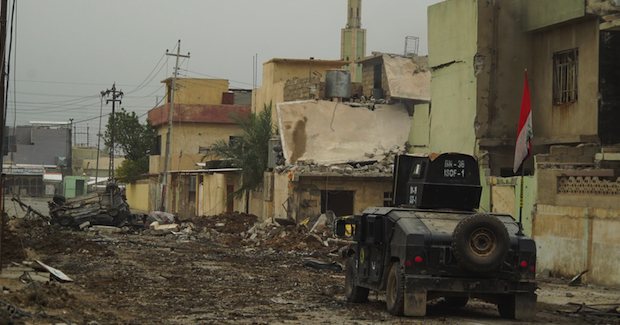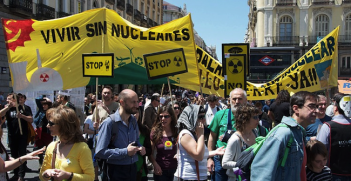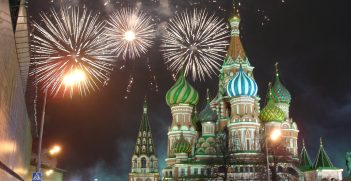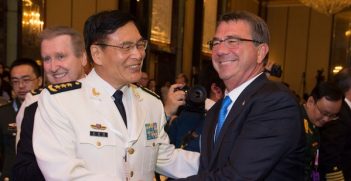The Day After: Iraq in the Wake of the Caliphate

While Mosul’s liberation from the Islamic State terrorist group appears closer than ever, Iraq’s challenges are far from over. The Iraqi government must work to address the conditions that enabled the rise of Islamic State and manage the political tensions that may escalate without a common enemy.
As the motley coalition arrayed against the Islamic State (IS) terrorist group continues its grinding offensive in the densely packed streets of western Mosul, there is a widely held view that the movement’s occupation of the city—and therefore its territorial project in Iraq—is ending. Whether framed as the imminent ‘fall’ of Mosul or its ‘liberation’, there is a risk that views such as these will foster the erroneous belief that the IS threat has been defeated in Iraq.
As a warning against this misleading perspective, it is timely to consider the conditions that enabled the group’s rapid territorial expansion from 2014; the social and political impacts of its occupation of Mosul and other cities; and the local, national, and regional actors—including the morphed remnants of IS—that will vie for power and influence in the vacuum left after Mosul’s liberation.
Corruption and poor governance
The foremost problem in Iraq continues to be corruption. While it has the outward appearance of procedural democracy, Iraq is better characterised as a ‘partyocracy’ where a small number of elites share power and use access to government ministries to maintain patronage networks. Iraq’s ethno-sectarian quota system, established during the US occupation, entrenches these elites and is resistant to the democratic reforms advocated by clerical authorities, academics and—in their tireless weekly protests—civil society groups.
Corruption is pervasive and embedded in Iraq’s large public sector workforce, dominating public political discourse. Corruption fuels a second, closely related problem: the ability of the Iraqi state to provide basic services, including security. Mass demonstrations in 2015 expressed popular anger at a lack of water and power during scorching summer heat.
It is in this context that IS led a coalition of anti-government actors. This included local political actors in majority Sunni areas and other battle-hardened insurgent groups in a united program opposed to the government of Nouri al-Maliki in Baghdad, resulting in the group’s rapid territorial expansion. This began with control of part of Fallujah in January 2014, the dramatic seizure of Mosul in June 2014 and the capture of Ramadi in May 2015.
The armed opposition to the al-Maliki government reflected frustration with corruption and poor governance. This was compounded by widespread sentiment in majority Sunni communities that they were being deliberately isolated from the nominally Shi’a elite controlling the state. Indeed, Sunni alienation was such that reports from the time show Mosul residents were initially welcoming of IS, at least until it began to institute its particularly rigid and violent interpretation of Islamic rule.
Corruption has corroded the professionalism and effectiveness of Iraq’s security institutions, which had to be rebuilt after the US disbanded the vanquished regime’s armed forces. As IS advanced, the Iraqi army was hamstrung by a vast number of “ghost soldiers”. These soldiers only existed on paper, yet nevertheless received a salary that was partially diverted to the pockets of officers who literally bought their positions to engage in this lucrative practice. When confronted by a force ironically led by the purged veterans of the former regime’s armed forces, the Iraqi army—notionally trained and armed by the US—fled from the alleged ferocity of IS fighters. Despite its putative battlefield successes, it remains questionable whether the Iraqi army is a credible fighting force given its reliance on US airpower.
The ongoing Mosul offensive is taking a heavy toll on the army’s most effective elements. It remains to be seen if it will be up to the tasks that will confront it after Mosul, not least the expected return of IS remnants to guerrilla and terrorist tactics. Through these tactics IS will seek to exacerbate divisions within the fragile coalition which opposes it, that is, the very divisions which created the conditions conducive to its territorial conquests from 2014.
Local, national, and regional contestation
By seizing territory and establishing its supposed caliphate, IS diverged from the al-Qaeda program of de-territorialised terrorism and guerrilla warfare. In so doing, it effectively made itself a target for conventional military action and, critically, US and Russian air power. As this project unravels, the Iraqi government will not be the only actor seeking to exercise power in northern Iraq.
Like the Popular Mobilisation Units (PMU) that were ostensibly established to fight IS and then disband afterwards, the Kurdish Iraqi forces, or Peshmerga, took part in military action in and around Mosul on the understanding that they would withdraw once the fighting concludes. Yet both of these groups clearly intend to play military and political roles in post-Mosul Iraq.
Indeed, the semi-autonomous Kurdish Regional Government (KRG) of northern Iraq has been accused of opportunism in exploiting the chaos to expand the area under its control by some 40 per cent. This predominantly occurred in the ‘disputed territories’ claimed by both Baghdad and the KRG, including the oil-rich city of Kirkuk. Already, this has generated conflict between the PMUs and the Peshmerga around Kirkuk. KRG President Masoud Barzani has renewed his strident calls for an independent Kurdish state. This leaves the US in a bind given its commitments to the central government in Baghdad—especially in regard to Iraqi territorial integrity—and the Kurds’ newfound international reputation as the most reliable allies in the fight against IS.
Iran has played both a direct and indirect role in the fight against the IS group and will expect to convert this into enduring political and security influence. The United States has stated its intention to maintain a military presence in Iraq, which is currently estimated at 5,500 personnel and includes boots on the ground in Mosul. Turkey has similarly asserted its security interests in Iraq—forcefully and provocatively at times. Saudi Arabia, long accused by Iraqis of stoking the conflict through indirect support of IS and other jihadist groups, is making diplomatic overtures indicative of enduring interests. Each of these will attract both positive and negative responses from a range of Iraqi actors, particularly as the liberation of Mosul contributes to a long-awaited resurgence of national pride.
Mosul’s long shadow
Iraq continues to face innumerable challenges. Some have been created by the impacts of IS, its territorial expansion and ongoing terrorist campaign. Others have deeper roots and were instrumental in creating the conditions conducive to its territorial expansion and three-year state building project. New conflicts will emerge in the political and military contestation that follows the liberation of Mosul. Freeing Iraq’s second largest city from terrorist occupation will be a significant event for Iraqis. However, Iraq’s troubles are set to continue for a long time and the international community should not assume that the Mosul milestone is a definitive turning point in restoring Iraqi national unity.
Damian Doyle is a PhD scholar at the Centre for Arab and Islamic Studies at the Australian National University. His research is focused on social movements and contentious politics in Iraq.
Dr Tristan Dunning is an adjunct research fellow and teaching instructor at the University of Queensland. He is the author of ‘Hamas, Jihad and Popular Legitimacy: Reinterpreting Resistance in Palestine’.
This article is published under a Creative Commons Licence and may be republished with attribution.





